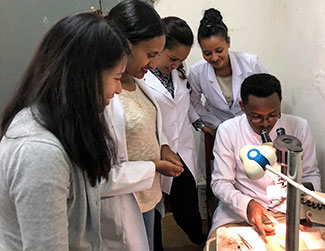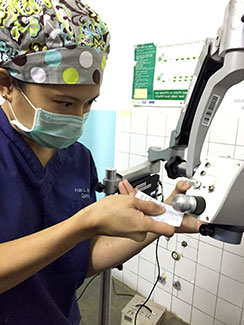
First Fogarty ophthalmology Fellow Dr Fran Wu studies rare pediatric cancer in Ethiopia
September / October 2018 | Volume 17, Number 5

Photo courtesy of Dr. Fran Wu
Dr. Fran Wu (left) trains Ethiopian ophthalmology residents
to perform microsurgery.
to perform microsurgery.
By Karin Zeitvogel
As the first Fogarty ophthalmology Fellow, Dr. Fran Wu spent a year in Ethiopia, researching a rare pediatric eye cancer called retinoblastoma. Six months after diagnosis, half of children in Ethiopia with retinoblastoma die or are lost to follow-up, while in countries like the U.S., nearly all children with the cancer survive.
Wu worked with pediatric ophthalmologist Dr. Sadik Taju Sherief at Menelik II hospital in Addis Ababa - one of few facilities in the country of 107 million that provide care for children with retinoblastoma. As Wu analyzed data Taju had gathered from his retinoblastoma patients, she tried to tease out answers to numerous questions. How long after first noticing the symptoms of the childhood cancer in a child did it take for parents to bring their children to the hospital? What treatment did a child receive? What were the six-month outcomes for these young patients?
Her research also raised new questions such as why were retinoblastoma patients presenting so late? She wondered what the follow-up and referral patterns of Ethiopian doctors were and what stressors were affecting the parents of children with retinoblastoma. To answer those questions, Wu launched several studies. For one, she asked all the ophthalmologists on the contact list of the Ophthalmological Society of Ethiopia what resources were available to them for diagnosing and treating retinoblastoma, and what their practice and referral patterns are. That study revealed wide variations in how the eye cancer is treated in Ethiopia and has led to another project aimed at standardizing retinoblastoma care in the Horn of Africa country.
For another study, Wu teamed up with a psychiatrist to investigate mental health stressors affecting the primary caregivers of children with retinoblastoma. Many of the caregivers interviewed for the study said they faced stigma and financial difficulties because of their child’s illness. Others cited difficulties in their marriage. “At least one person said they had to beg for money in the streets, just to be able to get an MRI for their child,” Wu said.

Photo courtesy of Dr. Fran Wu
That study also shed light on why children with retinoblastoma often present at Menelik hospital with advanced-stage illness. “Parents might notice the most common symptom of the cancer - leucocoria, which is an abnormal white reflection from the retina of the eye - months before they take their child for treatment, but might not have thought it was abnormal,” Wu said. “Or they might have thought it was abnormal but took their child to a health care provider who might not have understood that this needed referral and advanced treatment. That was a common story during our qualitative study - parents noticed it early but didn’t get the appropriate treatment, even if they brought their child to a health care provider.”
Patients in whom the cancer is detected early can often be treated with laser coagulation, whereas those who present with advanced retinoblastoma often require surgery to remove the eye - enucleation - and chemotherapy. “There are kids in the U.S. whose retinoblastoma was caught early, who have 20-20 vision. I did not see many patients like that in Ethiopia,” said Wu.
Wu’s research not only highlighted what needs to be done to improve retinoblastoma diagnosis and care in Ethiopia but also spurred further concrete action against the pediatric cancer. In May 2018, Wu helped organize the first symposium on retinoblastoma in Ethiopia, which was attended by ophthalmologists, oncologists, ministry of health officials, and NGOs that support the families of patients undergoing cancer treatment. Further symposia are being planned. “One of the goals of our symposia is to share how can we build capacity and train more ophthalmologists and oncologists to treat this disease,” said Wu.
Fogarty support was key to making Wu’s fellowship as productive and successful as it was. “Fogarty allowed me to spend a year in a country that needs my skills, where I forged personal relationships and had face-to-face time with families affected by retinoblastoma and the doctors trying to help them. I think that’s essential for any sustainable global health project,” said Wu.
More Information
- About retinoblastoma from the Genetic and Rare Diseases Information Center (GARD) at NIH's National Center for Advancing Translational Sciences (NCATS)
- Vanderbilt-Emory-Cornell-Duke Fogarty Global Health Fellowship Consortium
- Global Health Program for Fellows and Scholars
- Profiles of Fogarty Fellows and Scholars
To view Adobe PDF files, download current, free accessible plug-ins from Adobe's website





















.png)









No hay comentarios:
Publicar un comentario